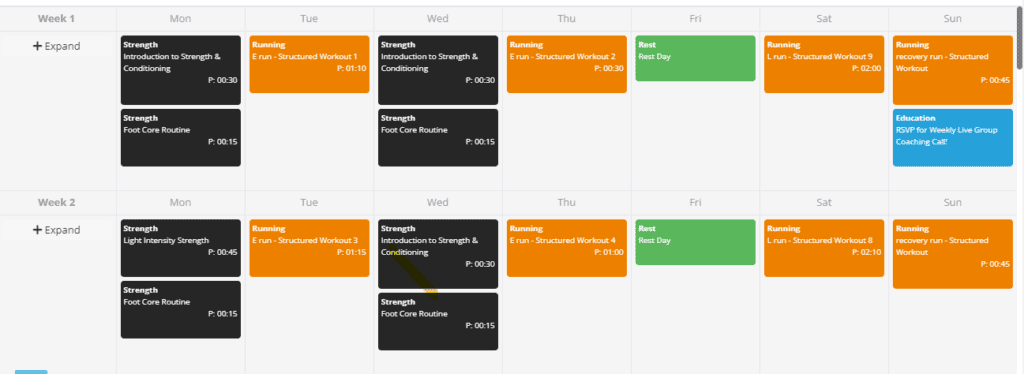You’ve set yourself the goal of completing a Marathon in under 4 hours and 30 minutes… Fantastic!
You’re probably thinking to yourself… How on earth do I get there?
Completing a marathon in 4:30 hours is achievable with the correct training plan, professional guidance, race day strategies, and mental strength to stay motivated throughout preparation and on race day. Of course, this also depends on your ability and previous running experience.

Let’s have a look at…
- Approach To a Sub-4:30-Hour Marathon
- How To Run a Sub-4:30-Hour Marathon
- Sub-4:30-Hour Marathon Plan Overview
- Sub-4:30-Hour Marathon Tips
Approach To a Sub-4:30-Hour Marathon
To achieve a sub- 4:30-hour marathon finish you need to run at around 10:18 minutes per mile or 6:23 minutes per kilometer.
The first place to start is to look at your overall training program…
What sort of training are you currently doing? How consistent have you been over the last 4-6 weeks? Are you doing any strength training at the moment?
This will dictate your training moving forward and which training plan you will use
Secondly, do you have the potential to run a Sub-4:30-hour marathon?
We do this by using 5, 10, half, and previous marathon efforts to determine how close you are to a sub 4hr30 potential.
Finding the correlation between your times is not always an easy thing to do. It’s not just a matter of “doubling your time” from 5k to 10k. An example, if you run a 30min 5k that doesn’t mean that your potential for a 10k is 60mins, it’s more likely around 62 mins. As we run longer we require more aerobic capacity and this is very often the aspect people neglect.
Often the biggest drop off in pace is from the half marathon to the marathon, highlighting the importance of aerobic conditioning.
For example, if you run a 27-minute 5km, this indicates the potential to run a 56-minute 10km, a 2:04 half marathon, and a 4:23 full marathon.
There should be a correlation between your shorter distance times (10km) and your long-distance times (Marathon).
If the correlation is poor, your half marathon times are slower relative to your 10km time, then you need to work on your endurance and make sure that you are not doing your long runs too hard, that you are doing long runs and that your long runs are the appropriate distance for the Marathon.
If you get relatively faster the longer you go, 10k’s are slow relative to your 21s and 42’s then we know that endurance is good and we need to focus on speed. A focus on shorter distances will lead to exponential improvements over longer distances
For most people, there is work to be done on both speed and endurance.
Program selection is key to ensuring the success of the framework and the program.
To run a sub-4:30-hour marathon you should be capable of running 10km in close to 57:30.
Now that we know how to approach tackling your goal of completing a Marathon in under 4 hours and 30 minutes… let’s have a look at how to achieve the goal.

How To Run a Sub-4:30-Hour Marathon
To determine who should be looking at running or following this particular sub-4:30-hour marathon program it is important to note that there are a couple of time goals you have to achieve.
We often get athletes who aim to run a sub-4:30-hour marathon with a current marathon time of 5:15hrs or a 36min 5km.… This is an example of unrealistic goal setting.
It’s not to say that you will never get to a 4:30-hour marathon … it is however important to note that if you are currently running a 5:15-hour marathon, you need to take smaller stepping stones to make sure that your easy runs are easy enough, the long runs are at the correct paces and you’re not doing too much too soon.
Your half-marathon time should be 2hrs13.
Your 10K time should be 57mins 30secs to have the potential to do the 4hr30 and 61min to use the plan to improve and get there.
Let’s have a look at an overview of the sub-4:30-hour marathon training plan…
Sub-4:30-hour Marathon Plan Overview
The Coach Parry sub-4:30-hour marathon plan is a 12-week plan, however, you cannot progress from no running … to a 12-week marathon plan and then expect to run a sub-4hr30 marathon and avoid injury.
This plan assumes you have been doing at least 8 – 12 weeks of consistent training or that you have progressed from a 10km or half marathon plan in the lead-up to starting the sub-4:30-hour plan.
We break those 12 weeks into 3 4-week cycles. Each 4-week cycle is broken down into 3 weeks of loading and 1 week of recovery.
For example, weeks one, two, and three will be building volume and Intensity, and every fourth week will be a recovery week where we reduce the volume of training, keep the frequency of running the same and reduce the volume of the intensity (this differs plan to plan though on your ability).
During each of the 3 cycles, we use different interval sessions to focus on building the different components of running fitness and address the specific requirements for your Marathon.
The long runs build up through each cycle and through the plan to ensure that you progressively prepare for your marathon without risking overuse injury.
In some of the recovery weeks, you will do a time trial. Time trials are used to measure progress.
Learn more about time trials in this video: The SECRET Session That Makes You Run FAST
Note: The platform is flexible so, while you may load a sub-4:30-hour plan, once you do your 1st 5km TT you can assess how far ahead or behind the plan you are to determine if you are on the correct plan and make changes if required.
This plan has a four-day running week, meaning you will be running four days a week on Tuesday, Thursday, Saturday & Sunday. (We do allow for flexibility so the days can be moved to fit into your schedule and life.)
There are long intervals built into some plans – dependent on ability, these are there to build speed endurance and running economy so that you can sustain the higher intensity for a longer period.
Tuesdays and Thursdays are usually easy runs starting at 1hr10 and building up to 1hr15 to 1hr30. We drive home that easy means that you should be able to have a full-on conversation if you’re running with someone or if you are running alone- break into song if you dare!
You should be able to breathe comfortably, have a light sweat, and at the end of that session feel that you can go a lot longer.
Saturdays are usually the long run day. For example, a 2-hour long run followed by a Sunday recovery 45-minute run. But you can interchange these if you wish.
This is a sneak peek into what your sub-4:30-hour training plan would look like:

It is very important to note that these are average times and should be adjusted for when running up or down hills. You will be anywhere between 15-45sec/km or a mile slower going uphill (gradient dependent) and 15-30sec faster going downhill.
Training Paces:
Easy Runs: 6:20-6:50/km (10:12-11 min/mile)
Long Runs: 6:25-7:05/km (10:20-11:24 min/mile)
Recovery Runs: 6:55-7:25/km (11:08-11:56 min/mile)
Introducing:
What you do in the 12 weeks leading up to your Marathon will either set you up for success or failure…
Ensure your success with 12 weeks of access to the Coach Parry Marathon Training Roadmap.

Sub 4hr30 Marathon Training Tips
- Go into training knowing you’re on the correct plan and that this is a realistic goal for you.
- Run your long runs at an easy pace to build a solid aerobic base. (Stick to the prescribed paces)
- Stay consistent with training
- Stick to the plan and trust the process.
- Try a variety of nutrition products specifically on your long runs to make sure you have a sound fuelling and hydration plan that has been practiced come race day.
- Make sure you do the correct strength training.
Making sure you do the correct strength training is important. The good news is we’ve created a free strength training plan for runners that you can download by clicking here.



Comments are closed.